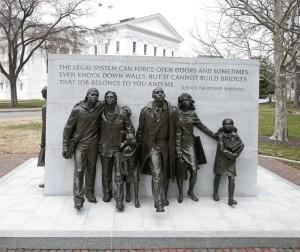- Ssush22: Civil Rights Us History Packet Answers
- Ssush22: Civil Rights Us History Timeline
- Ssush22: Civil Rights Us History United States
Concept 1: Civil Rights Movement Standard: SSUSH22 The student will identify dimensions of the Civil Rights Movement, 1945-1970. Explain the importance of President Truman’s order to integrate the U.S. Military and the federal.
Describe the causes and consequences of the Civil Rights Act of 1964 and the Voting Rights act of 1965:
Civil Rights act of 1964: This act was first proposed by John F Kennedy, but was signed into law by President Lyndon B. Johnson. The act ended segregation public places and banned any type of discrimination on race, gender, sex, or national origin. This act has thus been considered one of the greatest legislative achievements.

Ssush22: Civil Rights Us History Packet Answers
24th Amendment: This amendment states that the united states cannot abridge or deny a citizen who hasn’t paid taxes to vote for and election whether it be the election or president or vice president. This gave more people the chance to vote if hey had fewer voting rights.
Voting rights act of 1965: Was signed into law by Lyndon Johnson, was aimed to overcome legal barriers that prevent the right of African Americans to vote at state and local level. There isn’t any provisions besides the fact that this act was designed to prevent backsliding by states whose discriminatory literacy tests were outlawed by the original act in 1965.
Reflection: The civil rights act and voting act both went towards the expansion of rights of African Americans and others as well. Discrimination was cut down dramatically, and many more people started to feel free.
The standard requires to describe the causes consequences of the Civil Rights act of 1964 and the Voting Rights act of 1965.
The Civil Rights Act of 1964 was signed by the President Lyndon B. Johnson. The act ended racial segregation in public places and prohibited employment discrimination on the basis of race, colour, religion, sex or national origin. It became an important accomplishment for the Civil Rights movement. The next year the Voting Rights act was passed. It banned discriminatory voting practices such as literacy tests.



In the 24th amendment it is established that no one can be denied voting on the grounds of failure of paying a poll tax. It allowed people to vote without having money and made discrimination harder.
Ssush22: Civil Rights Us History Timeline
- Describe the causes and consequences of the Civil Rights Act of 1964 and the Voting Rights Act of 1965. 1964––The Civil Rights Act of 1964 was signed into law by President Lyndon Johnson. This law prohibited discrimination based on race, religion, national origin, and gender.
- Author jakejh Posted on March 22, 2017 Categories SSUSH22 Tags civil rights, education, us history Leave a comment on SSUSH22e The causes and consequences of the Civil Rights Act of 1964 and the Voting Rights act of 1965.
- Standard E: Describe the causes and consequences of the Civil Rights Act of 1964 and the Voting Rights act of 1965. The Civil Rights Act of 1964 was signed by President Lyndon Johnson on July 2nd; it prohibited the discrimination faced by minorities in public places, made employment discrimination illegal, and provided for the integration.
- Week 16: – Unit 12 – Civil Rights: SSUSH22, SSUSH23, SSUSH24: Civil Rights Movement, Impact of Political Development, Social Change Movements/Organizations, Week 17: Unit 13 – Modern Era: SSUSH25: Modern Era, Week 18: Review and Final Exams.
Ssush22: Civil Rights Us History United States
Voting Rights Act of 1965 was made to overcome ways to prevent African Americans from voting. It’s considered one of the widest civil rights legislation passed in the US. The local enforcement was weak and the law was often ignored. Especially in South because the black population was big and they might have changed the political state by voting.
Reflection: It always surprises me how bad things were for some people not so long ago. Even though the Constitution has always been so important for Americans, they just think about themselves. Fortunately all these Acts have been passed by people who saw that things were wrong. Today public facilities and voting are equal thanks to the Civil Rights Act and Voting Rights Act.
